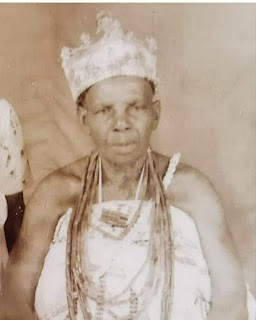IN MEMORY OF OMU MGBOUSHE OF ASABA: THE CIVIL WAR HEROINE, BETRAYED BY HER PEOPLE AND KILLED BY SOLDIERS
IN MEMORY OF OMU MGBOUSHE OF ASABA: THE CIVIL WAR HEROINE, BETRAYED BY HER PEOPLE AND KILLED BY SOLDIERS
By Emeka Esogbue
Although the Omu Mgboushe of Asaba statue stands reverently erect in front of Ogbeogonogo Market in Asaba, most visitors and natives alike do not know the history behind the statue. Nevertheless, the statue stands to historically testify to the wartime atrocities and deaths that the people of Asaba suffered during the Nigerian Civil War.
Omuship is a 500- year female traditional institution that exists among the Anioma people. The institution also once existed in Onicha Ado (Onitsha) and Ossomarri, two other Anioma communities that are now outside the geographical Delta State.
Omuship, charged with the spiritual, economic, and political responsibilities to their respective Anioma communities is the pride of the people. It is also the traditional vehicle for the movent of women in this region. Take for instance, in Ibusa, a community of about 6 miles from Asaba, the state capital, the Omu could attend The Traditional Parliament to give her views. In Asaba, the Omu was one of the signatories of the Asaba Treaty with the British and in Okpanam, Omu Martha Dunkwu is reputed today to be the foremost promoter of the people's socio-cultural institution and the most famous traditional face of Okpanam and probably the whole of Anioma.
Perhaps, no traditional institution among the Anioma people has faced serious challenges in history as did Omuship. The reasons for this are multiple but traceable to the female nature of the institution in the male-dominated world of Africa in Anioma.
Asaba, Okpanam, and Onicha-Olona are examples of two Anioma communities famously known to enjoy unbroken lines and history of the existence of Omuship amid several Anioma communities with broken records of this institution. For instance, Omuship in Ubulu-Uku, Onitsha, Ibusa, and others is no more in place. In Issele-Uku, Ugbodu, and a few other communities of Anioma, the institution has become revived in recent times with the efforts of this author who authored the book, "A Short History of Omu" and HRM Omu Dr. Martha Dunkwu, the Omu of Okpanam/Anioma. Omu Dunkwu's figure has globalized the institution while this author's book, the first on Omuship and frequent publicity of the institution have had revival impacts on the people.
Omu Mgboushe of Asaba suffered a similar fate in the hands of her people. During the Nigerian Civil War when Asaba was under the Nigerian soldiers that had invaded the Anioma region following an initial invasion of the Midwest Region to which Anioma was part, the Nigerian forces took occupation of Anioma form where they advanced to the defunct Eastern Region, the war theatre.
The referred hospitable Omu Mgboushe was known to prepare delicious food for both the Nigerian and Biafran soldiers which they ate freely. The two parties to the war would forget that they were at war until they were several kilometres away from her palace.
As the war raged, and the Federal Troop made attempts to push the battle to Biafra, their boats, warships, and other military wares heading to the enemy region kept crashing and capsizing into the River Niger. The puzzled soldiers were told by her people who had a friendly relationship with soldiers of the Federal Troop that the Omu who was also the custodian of Onishe, the Asaba River goddess, and the Onishe goddess were responsible for their plight. The Omu that could not die by shooting had her remains burnt to death after initial clubbing.
"In all, the Omu was betrayed by people she loved and helped. Killed by soldiers she never knew, yet fed," says Ogbueshi Lawrence Ngozi Okolie, an indgene of Asaba who posted a commentary about the hospitable Omu on his Facebook wall.
Typical of the natural powers inherent in Anioma Omus, the Omu murderers were mysteriously made to watch over her corpse until they were caught.
"She was woken up, early hours of December 15th, 1969 by a voice she recognized. She thought the person came to hide in her home but when she opened the door, she was murdered in a most gruesome way. But she proved her worth, the murderers sat watching over her body, till they were apprehended. Then, 30 days later, the "unreasonable" war, officially ended. We pray GOD, to rest her loving soul."
Stories of saving rivers and other divinities are replete in Anioma's histories of the Nigerian Civil War.
During the war, the Nigerian soldiers were believed to have been confused by the Oboshi River with the soldiers that consumed forbidden fish from the river developing swollen stomachs according to the Ibusa story. In Okpanam, 'Ebunu' is said to have also played a role in preventing soldiers from gaining entry into the community despite the involvement of the 'giant' figure of Major Chukwuma Kaduna Nzeogwu.
The Omu hailed from Umuagu Quarters of the community and was married to Okolie from Umuaji also from Asaba.
Emeka Esogbue was in 2015 awarded The Patriot Award in Recognition of His Patriotic Contributions to Extensive Research and Literature on the Anioma People by Anioma Association USA, Inc, Georgia Chapter

Comments
Post a Comment